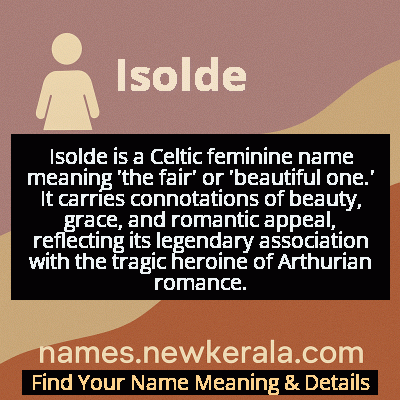Isolde Name Meaning & Details
Origin, Popularity, Numerology Analysis & Name Meaning of Isolde
Discover the origin, meaning, and cultural significance of the name ISOLDE. Delve into its historical roots and explore the lasting impact it has had on communities and traditions.
Name
Isolde
Gender
Female
Origin
Celtic
Lucky Number
1
Meaning of the Name - Isolde
Isolde is a Celtic feminine name meaning 'the fair' or 'beautiful one.' It carries connotations of beauty, grace, and romantic appeal, reflecting its legendary association with the tragic heroine of Arthurian romance.
Isolde - Complete Numerology Analysis
Your Numerology Number
Based on Pythagorean Numerology System
Ruling Planet
Sun
Positive Nature
Leaders, ambitious, highly driven, self-reliant, innovative.
Negative Traits
Overly aggressive, domineering, impatient, selfish.
Lucky Colours
Red, orange, gold.
Lucky Days
Sunday.
Lucky Stones
Ruby, garnet.
Harmony Numbers
2, 3, 9.
Best Suited Professions
Entrepreneurs, managers, engineers.
What People Like About You
Courage, determination, leadership.
Famous People Named Isolde
Isolde of Ireland
Legendary Queen
Central figure in the Tristan and Isolde legend, known for her tragic love story
Isolde Liebherr
Business Executive
Chair of Liebherr Group, one of the world's largest construction equipment manufacturers
Isolde Kostner
Olympic Skier
Italian alpine skier who won multiple Olympic and World Championship medals
Isolde Ahlgrimm
Harpsichordist
Renowned Austrian harpsichordist and pioneer in historical performance practice
Name Variations & International Equivalents
Click on blue names to explore their detailed meanings. Gray names with will be available soon.
Cultural & Historical Significance
The character of Isolde embodies the conflict between duty and desire, making her a timeless symbol of forbidden love. Her story has been adapted in numerous operas (most famously by Wagner), poems, novels, and films, cementing her place in the cultural imagination. The name carries with it centuries of artistic and literary tradition, representing both Celtic heritage and the universal themes of love, fate, and tragedy that continue to resonate across cultures and generations.
Beyond the legendary figure, the name Isolde connects to broader Celtic cultural traditions, where strong female characters often played significant roles in mythology and folklore. The persistence of the name through centuries demonstrates its enduring appeal and the powerful cultural memory associated with its legendary bearer.
Extended Personality Analysis
Women named Isolde are often perceived as possessing a romantic and passionate nature, reflecting the legendary character's intense emotional depth. They tend to be artistic, sensitive individuals with a strong appreciation for beauty and aesthetics. The name suggests someone who is deeply feeling, possibly with a melancholic or introspective side, yet also possessing inner strength and resilience. There's an air of mystery and sophistication associated with the name, suggesting a person who values deep connections and meaningful relationships over superficial interactions.
Isoldes are often seen as intelligent and perceptive, with a natural elegance and grace. They may have a strong sense of loyalty and devotion, much like their legendary namesake, but this can sometimes lead to internal conflicts between heart and duty. The name carries connotations of someone who is both strong-willed and vulnerable, capable of great passion but also susceptible to deep emotional wounds. This complex personality profile makes Isolde a name associated with depth, complexity, and emotional richness.
While these traits are largely influenced by cultural associations rather than scientific evidence, the name's literary heritage creates certain expectations about personality. Parents who choose this name often envision their daughter as someone with depth of character, artistic sensibility, and the capacity for profound emotional experiences. The name suggests a person who moves through life with both passion and purpose, unafraid of deep feeling or complex emotional landscapes.
Modern Usage & Popularity
In contemporary times, Isolde remains a relatively uncommon but distinguished choice for baby girls, particularly among parents seeking names with literary or mythological significance. The name has seen a modest resurgence in recent years, especially in European countries and among families with Celtic heritage. It's often chosen by parents who appreciate classical names with romantic connotations but want something less common than popular choices like Isabella or Sophia. The name maintains an air of sophistication and cultural depth, making it appealing to those who value tradition while seeking something distinctive. Its usage patterns show it's particularly popular in Germany, Austria, and among English-speaking communities with an interest in Arthurian legends or opera. While it hasn't broken into mainstream popularity charts in most English-speaking countries, it enjoys steady usage among educated, culturally-aware parents who want a name with historical weight and artistic associations.
Symbolic & Spiritual Meanings
Symbolically, Isolde represents the eternal themes of passionate love, fate, and the tragic beauty of human emotion. The name has become synonymous with the idea of love that transcends social boundaries and even death itself. It symbolizes the conflict between personal desire and social obligation, making it a powerful metaphor for the human condition. The legendary love potion that binds Tristan and Isolde represents the uncontrollable nature of true passion, while their tragic fate speaks to the idea that great love often comes with great sacrifice. The name also carries Celtic symbolism of feminine power, intuition, and connection to ancient wisdom traditions. In a broader sense, Isolde embodies the romantic ideal that true love is worth any price, making it a name rich with symbolic meaning about the transformative power of deep emotional connection. The name serves as a reminder that some emotions are so powerful they can redefine destiny itself, representing both the ecstasy and agony of profound human attachment.

